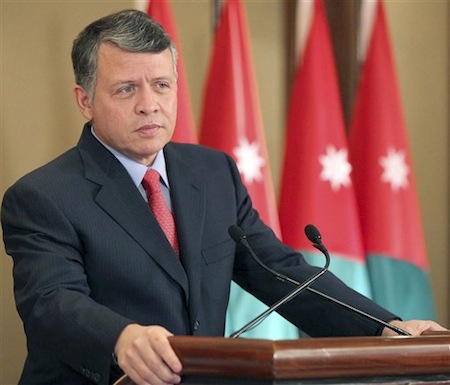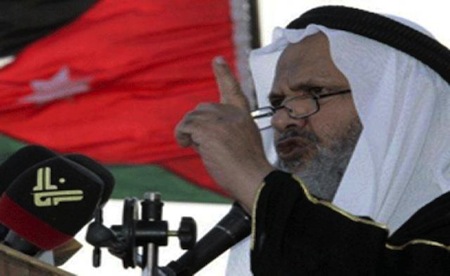Jordan goes to the polls in the second election in as many days in the Middle East. But unlike Israel’s topsy-turvy free-for-all, don’t expect much change as a result of today’s Jordanian parliamentary elections.![]()
The salient feature of today’s election is that the Muslim Brotherhood isn’t participating — many of the parliamentary seats will be won by ‘independents’ who support Jordan’s monarchy.
Though it didn’t threaten to topple Jordan’s monarch like it did the governments of Tunisia, Egypt, Libya and Yemen, the Arab Spring nonetheless visited the country in February 2011 in the form of protests for more representative government and, more recently, riots in November 2012 following cuts in fuel subsidies last year.
Budget austerity has come even to the Hashemite Kingdom, where times are tough, economically speaking — the country, which lacks the rich mineral and oil wealth of Saudi Arabia, Iraq, and the United Arab Emirates, is notching some of the lowest GDP growth in a decade and its budget deficit rose in 2012 to 6.5% of GDP.
Within Jordan’s bicameral Majlis al-Umma (National Assembly), the Majlis al-Nuwaab (Chamber of Deputies), newly expanded to 150 members, are elected in single-seat constituencies, and those 150 deputies are who will be elected in Wednesday’s vote. The upper house, Majlis al-Aayan (Assembly of Senators), remains more powerful and is comprised of 60 senators, all of whom are appointed by Jordan’s king.
Much of the Jordanian government’s power resides in the Hashemite monarchy, headed since 1999 by Abdullah II (pictured above, top). The king holds the executive power to sign, implement (or veto) Jordanian laws, may suspend or dissolve parliament, appoints (and dismisses) all judges, retains all military power and the ability to set foreign policy.
In recent years, Abdullah has attempted to open, however slightly, the governing process. For example, after the 2011 protests, Abdullah agreed to an elected cabinet determined by the Chamber of Deputies — the idea is that the Chamber of Deputies, and not Abdullah, will choose the next prime minister, even if the deputies themselves are pro-government. Although most of the seats (108) are eligible to be contested only by ‘independents,’ 15 additional seats are reserved for women, and just 27 seats are eligible to be contested by political parties on the basis of a national proportional representation vote.
Despite the reforms, the Muslim Brotherhood has demanded that at least 50% of the seats in the Chamber of Deputies be determined by party list, so the relatively narrow opportunity to compete is high on its list of rationales for boycotting the election.
The Muslim Brotherhood created a Jordanian political party in 1992, the Islamic Action Front (جبهة العمل الإسلامي), which is relatively more liberal than most Islamist parties throughout the Arab world (for example, it’s pro-democracy).
Although it won 20 out of 84 eligible seats in the June 2003 parliamentary elections, it won just six seats in the subsequent November 2007 elections, and it boycotted the 2010 elections.
Other smaller parties, including Jordanian communists and Arab nationalists, are also boycotting Wednesday’s parliamentary vote.
The Muslim Brotherhood’s leader, Sheikh Hammam Said (pictured above, bottom) has argued that the 2011 reforms don’t go far enough — in addition to the 27-seat limit, he has called for an end to corruption practiced by the various governments appointed in the past by the monarchy.
The boycott by Jordan’s largest opposition force, however, threatens to undermine the legitimacy of the elections.
Abdullah II succeeded his father, Hussein, who ruled Jordan from 1953 until his death in 1999. Jordan, which became an independent nation in 1946, was ruled previously by Abdullah I, who was assassinated in 1951 by Palestinians angered, in part, by his collusion with respect to the creation of the Israeli state.
Jordan, with a population of just 6.5 million, has had a long and turbulent history with the Palestinians — after Israel took control of the West Bank after the Six-Day War in 1967, Palestinian refugees swarmed Jordan. By 1970, relations had ebbed to the point where Jordan neared the point of civil war between Jordanian forces and Palestinian guerrillas during the ‘Black September’ uprising. Although Hussein recognized Yasser Arafat’s Palestinian Liberation Organization in 1974, Jordanian-Palestinian relations remained testy and by 1986, Hussein ordered Arafat out (he went to Lebanon, to somewhat destabilizing effect).
Nonetheless, today, Palestinians from Israel and the West Bank now outnumber those Jordanians — known as ‘East Bank Jordanians’ — who were originally descended from the Arab tribes that originally populated what is today Jordan. There’s a socioeconomic component to the split, and the mostly urban Palestinians are poorer than the more tribal East Bank Jordanians. Much of the Muslim Brotherhood’s support in Jordan derives from the relatively less affluent and more religiously conservative Palestinians, not from East Bank Jordanians, which support the monarchy in greater numbers.
That explains, as much as anything, why the Muslim Brotherhood in Jordan remains so politically marginalized.
Since the initial ‘Arab Spring’ protests in February 2011, Abdullah has gone through a series of prime ministers and governments, starting with former army general Marouf Bakhit, who was replaced in October 2011 by Awn al-Khasawneh, a judge in the International Court of Justice. In turn, Abdullah appointed Fayez al-Tarawneh — a former prime minister in 1998-99 when Abdullah ascended to the monarchy — in April 2012.
In October 2012, however, with continued agitation over the pace of political and economic reform, Abdullah appointed Abdullah Ensour, a reformist former minister, as prime minister, and called early elections.
Perhaps it’s ironic that the Muslim Brotherhood in Jordan has found itself relatively more powerless after the onset of the Arab Spring, given that the Muslim Brotherhood in Egypt now controls the presidency under Mohammed Morsi in the aftermath of the ‘Arab Spring,’ and Islamist parties are thriving in Tunisia and Libya.
It’s also ironic in light of the fact that, throughout the ‘Brotherwealth’ — those countries in the Arab World where the Muslim Brotherhood has developed (including not only Egypt, where the Islamic movement was founded in 1928, but also in Bahrain and in Palestine) — Jordan’s Muslim Brotherhood has had a relatively easygoing history with the semi-authoritarian regime.
As Nathan J. Brown writes in When Victory is Not an Option: Islamist Movements in Arab Politics:
Jordan’s Islamists have never experienced the extreme bouts of repression of their counterparts in Egypt; for much of its history, the Jordanian Brotherhood’s relationship with the regime has been far less hostile. But the emergence of semiauthoritarianism in Jordan had a similar effect. It led to an increase in the Brotherhood’s politicization and a slow but definite move to grasp at the opportunities presented by casting itself as the country’s most viable opposition political force. While the general contours of the Jordanian cat-and-mouse game are similar to the Egyptian (in which initial moves toward politicization have been tolerated but later moved have sparked regime countermeasures), the Jordanian regime has been a bit steadier and less capricious.
Nonetheless, in the wake of the 2013 parliamentary elections, the Jordanian regime seemed headed for a political collision with the Jordanian Brotherhood.


One thought on “Muslim Brotherhood boycott highlights Jordanian elections”